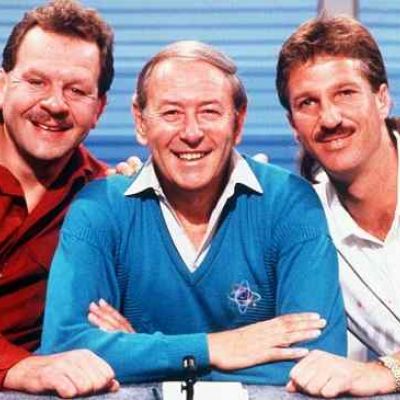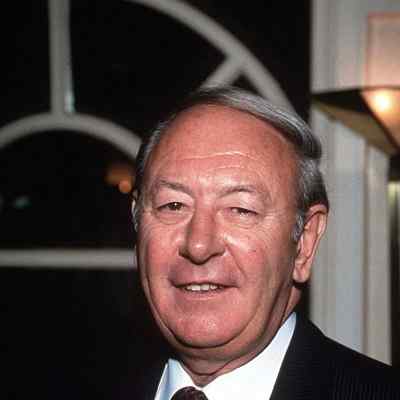David Coleman is a British sports commentator who has worked for the BBC for many years. David Coleman has presented sports talk shows, called football games, and covered Olympic events. He was also well-known for his “Colemanisms,” or slips of the tongue. Similarly, some of these, as well as those of other critics, were converted into a series of amusing books titled ‘Colemanballs.’
Table of Contents
Wiki, Bio, Age, Family, Siblings, Childhood & Education
David Coleman was born on April 26, 1926, in Alderley Edge, Cheshire, England, to Irish parents. His immediate family was originally from County Cork. He is a British citizen. He was born under the sign of Taurus.
At the moment, his name and details about his parents are unavailable. Similarly, no information about any other family members, such as siblings or others, is accessible at this time. He has kept his personal and family life private and has never discussed them in public.
In terms of his educational background and qualifications, the names of the schools, high schools, and universities that he attended are not yet published. Given his employment and career, he must have graduated from both high school and university.
Coleman was also an avid amateur runner who competed as a schoolboy middle-distance runner. He was the only non-international runner to win the Manchester Mile as a member of Stockport Harriers in 1949. Similarly, he competed for Manchester Athletic Club in the English National Cross-Country Championships in 1952 (116th, 3rd team) and 1953 (116th, 4th team) (118).
He also ran 440 yards (1/4 mile) for Staffordshire. However, an accident forced him to retire from competitive running, and he went on to become president of the Wolverhampton & Bilston Athletics Club.
Death
Coleman died on December 21, 2013. After a brief illness, he breathed his final breath at his Berkshire home.
David Coleman’s Height, Weight & Body Measurement
David Coleman’s bodily dimensions, including height, weight, chest size, waist size, hip size, and any additional measures, are not currently available. All of those bodily measures were included in the evaluation but were never revealed. He did, however, have light brown hair and brown eyes.

David Coleman’s Profession & Career
David Coleman worked for the Stockport Express as a reporter. He also worked for the British Army Newspaper Unit while serving in the Royal Corps of Signals. Similarly, he served in Kenya for a portion of his national duty. During WWII, he worked as a batman for someone named Walter Jaundrill. Even after the war, they remained friends.
After demobilization, he joined Kemsley Newspapers and, at the age of 22, became editor of the Cheshire County Express. Due to hamstring issues, he did not compete in the 1952 Olympic trials, instead of contacting the BBC to ask if they needed assistance with athletics coverage. Despite the fact that Coleman had not auditioned, the BBC requested him to cover Roger Bannister at Bradford City Police Sports. The next year, he began working as a freelance radio broadcaster in Manchester.
Coleman came to Birmingham in 1954 and began working for the BBC as a news assistant and sports editor. His first appearance on television was on Sportsview on the day Roger Bannister broke the four-minute mile. In November 1955, he was named Sports Editor for the BBC’s Midlands Region.
Similarly, in October 1958, the BBC’s Head of Sport, Peter Dimmock, hired him to host the new Saturday afternoon sports show Grandstand. He even stayed on as a frequent presenter until 1968. From 1961 to 1972, he was the BBC Sports Personality of the Year, and from 1968 to 1972, he hosted Sportsnight, as well as other special athletic events such as the Grand National.
More on Career…
Coleman also covered The Beatles’ return from the United States and the 1959 General Election for the BBC from the Press Association’s offices. Coleman was also a sports pundit in addition to being a presenter. From Rome in 1960 through Sydney in 2000, he presented and commented on 11 Olympic Games and eight Commonwealth Games. He covered seven World Cups as both a commentator and a presenter.
Coleman was the BBC’s main football analyst for several years beginning in 1971. He also provided commentary for the World Cup Finals in 1974 and 1978, as well as the European Cup Finals in 1973 and 1975, and the FA Cup Finals from 1972 to 1976. Coleman was unable to play in the 1977 FA Cup final due to a legal issue with the BBC, allowing John Motson to make his debut. Similarly, he returned for 1978 final before being replaced by Motson the following year.
Similarly, his final live football commentary was on May 26, 1979, when he chronicled England’s 3-1 victory over Scotland at Wembley Stadium in the 1978-79 British Home Championship. He did, however, continue to work as a backup commentator at football events until October 1981. His last appearance, though, was a midweek League Cup match between Tottenham Hotspur and Manchester United.
Athletics
Then, in 1968, when commentating on David Hemery’s success in the 400m Hurdles at the Mexico Olympics, Coleman was clocked at 200 words per minute. He could only recognize the first two after the race and yelled, “Who cares who’s third?” The bronze medalist was revealed to be another Briton, John Sherwood. However, most later showings of the race have named the line out in honor of Sherwood.
Furthermore, satirists in the 1980s and 1990s frequently depicted Coleman as constantly startled by mundane events at sporting events. Similarly, Clive James stated that the difference between commentating and “colemantating” is that a commentator says something you want to remember, whereas a colemantator says something you want to forget.
His ability to build excitement through his comments, on the other hand, received a lot of praise. Then, in 1972, he broadcast for several hours throughout the Munich Olympics siege, as well as the memorial ceremony a few days afterward. Coleman began focusing on sports commentary in 1984.
Retirement and Beyond…
Coleman also presented the sports quiz show “A Question Of Sport” for 18 years, from 1979 to 1997, building good relationships with captains including Emlyn Hughes, Ian Botham, Willie Carson, and Bill Beaumont. And, while he hosted the vast majority of the shows, he was periodically absent, necessitating the use of stand-in hosts. When Coleman became unwell in 1989, former host David Vine returned to the show.
Similarly, in 1996, Bill Beaumont hosted two installments, while Will Carling temporarily replaced Beaumont as team captain, and Sue Barker hosted two editions later that year. Furthermore, his on-air gaffes, cliché use, and occasional mispronunciations prompted the satirical magazine Private Eye to call its sports bloopers column Colemanballs — a word coined by Coleman himself – in his honor.
Coleman stepped down as a broadcaster following the Summer Olympics in 2000. In December 2000, he was awarded the Olympic Order by then-IOC president Juan Antonio Samaranch in appreciation of his contributions to Olympic principles. He subsequently retired, asking no fanfare or recognition from the BBC despite having worked for the organization for more than 40 years.
In addition, the BBC later aired a program called “The Quite Remarkable David Coleman” to commemorate Coleman’s life. This episode was broadcast in May 2011, just after his 85th birthday.
David Coleman’s Wife, Marriage & Relationship
David Coleman and his wife, Barbara, had six children. In 1952, he married Barbara Manning in north-east Cheshire. His daughter Anne was a British ladies’ showjumping champion when she was born in 1954. His son Michael, born in 1962, was a Panavia Tornado navigator who flew in the 1991 Gulf War. He also rose to the rank of Squadron Leader. Furthermore, they produced twin sons in 1955, as well as two other daughters in 1961 and 1969.
He was born in Warwickshire and raised in Buckinghamshire. Then, in the New Year’s Honours List of 1992, he was awarded the OBE for services to broadcasting. In addition, at the 1996 Royal Television Society Awards, he got the Judges’ Award For Sport.
David Coleman’s Income & Net Worth
However, when it comes to his earnings and income, trendcelebsnow reports that he has a net worth of $1 million to $5 million.
Quicks Facts
| Full Name | David Coleman |
|---|---|
| Born Date | 26 Apr 1926 |
| Age | 95 years old |
| Horoscope | Taurus |
| Lucky Number | 3 |
| Lucky Stone | Emerald |
| Lucky Color | Green |
| Best Match for Marriage | Virgo, Cancer, Capricorn |
| Death Date | December 21, 2013 |
| Gender | Male |
| Profession | TV Show Host |
| Country | England |
| Marital Status | married |
| Wife | Barbara Manning |
| Net Worth | $1 Million – $5 Million |
| Eye Color | Brown |
| Hair Color | Light brown |
| Birth Place | Alderley Edge, Cheshire |
| Nationality | British |
| Kids | Six |
| IMDB | David Coleman IMDB |
| Wiki | David Coleman Wiki |
| Brands | N/A |
| Hobbies | N/A |

